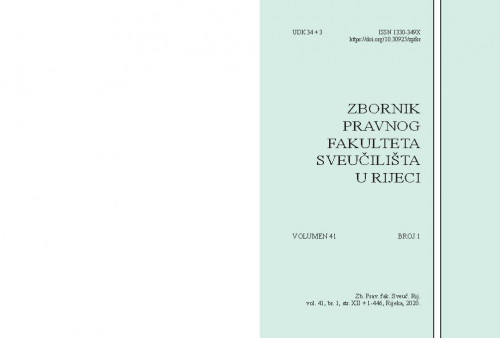After four years since Regulation (EU) No 650/2012 of the European Parliament and of the Council of 4 July 2012 on jurisdiction, applicable law, recognition and enforcement of decisions and acceptance and enforcement of authentic instruments in matters of successions and on the creation of a European Certificate of Succession has been implemented, in the paper certain theoretical, as well as implementationpractical issues will be analysed and discussed, based on the results of an empirical study on the implementation of the Regulation in Croatia and Slovenia during May – September 2019. The aim of the research is to detect and analyse the deficiencies of the existing normative regulation and problems in the implementation of the Regulation through the analysis of the normative framework of the Regulation, as well as European and national, Croatian and Slovenian implementing regulations and the experience of three groups of Croatian and Slovenian practitioners (judges, notaries, attorneys-at-law). After introductory remarks on the subject matter and methodology of the research, in the paper the succession matter with a cross-border element, the material scope of the Regulation and its relation to other European regulations are determined. Then follows the part of the paper on the principle of the unity of the estate, in which certain issues with situations of the existence of property constituting the estate in third states are discussed, especially in neighbouring post-Yugoslav states. Within the fourth part of the paper on the jurisdiction, the issues of determining the habitual residence in practice, the challenges faced by the competent authorities in determining jurisdiction based on that link are analysed and discussed, as well as specific issues with the agreement on the choice-of-court.; Vier Jahre seit der Anwendung der Verordnung (EU) Nr. 650/2012 des Europäischen Parlaments und des Rates vom 4. Juli 2012 über die Zuständigkeit, das anzuwendende Recht, die Anerkennung und Vollstreckung von Entscheidungen und die Annahme und Vollstreckung öffentlicher Urkunden in Erbsachen sowie zur Einführung eines Europäischen Nachlasszeugnisses wird man in diesem Beitrag sowohl theoretische als auch praktische Fragen aufgrund der Ergebnisse der während Mai – September 2019 durchgeführten empirischen Untersuchung über die Anwendung der Verordnung in Kroatien und Slowenien darstellen. Ziel dieser Untersuchung ist es, durch die Analyse normativen Rahmens dieser Verordnung sowie auch europäischer und nationaler (kroatischer und slowenischer) Implementierungsvorschriften und durch die Erfahrung drei Gruppen kroatischer und slowenischer Praktiker (Richter, Notare, Anwälte) die Mängel dieser normativen Regelung und Probleme bei dessen Anwendung zu bestimmen und analysieren. Nachdem man in der Einführung den Gegenstand und die Methodologie der Untersuchung darstellt, versucht man im Beitrag, die Erbsachen mit grenzüberschreitendem Element, den materiellen Bereich der Anwendung dieser Verordnung und deren Beziehung gegenüber anderen europäischen Verordnungen zu bestimmen. Danach erörtert man den Grundsatz der Einheit des Nachlasses und bespricht diesbezüglich manche Fragen verbunden mit dem zum Nachlass gehörenden Vermögen in Drittländern, insbesondere in postjugoslawischen Ländern. Im Rahmen der Zuständigkeit analysiert und bespricht man die Fragen der Bestimmung des gewöhnlichen Aufenthaltsortes in Praxis, die Herausforderungen, mit denen sich die zuständigen Körper bei der Bestimmung der Zuständigkeit einsetzen, sowie auch manche mit dem Zuständigkeitsübereinkommen verbundenen Fragen.; A quattro anni dall’entrata in vigore del Regolamento (UE) n. 650/2012 del Parlamento europeo e del Consiglio, del 4 luglio 2012 , relativo alla competenza, alla legge applicabile, al riconoscimento e all’esecuzione delle decisioni e all’accettazione e all’esecuzione degli atti pubblici in materia di successioni e alla creazione di un certificato successorio europeo, nel lavoro si disaminerà e si dibatterà di alcune questioni tanto teoriche, quanto pratico-applicative sulla base dei risultati cui s’è pervenuti in seguito ad una ricerca empirica condotta tra maggio e settembre del 2019 con riguardo all’applicazione del Regolamento in Croazia ed in Slovenia. Lo scopo della ricerca è quello di determinare ed analizzare attraverso l’analisi del quadro normativo del Regolamento e delle normative europee e nazionali, croate e slovene, come pure valutando le esperienze di tre professioni legali croate e slovene (i giudici, i notai e gli avvocati) le lacune della disciplina normativa esistente ed i problemi legati all’applicazione del Regolamento. Dopo le note introduttive sull’oggetto e la metodologia della ricerca condotta, nel lavoro si tenta di determinare la successione con elementi di transnazionalità, l’ambito di applicazione sostanziale del Regolamento, come pure il rapporto rispetto agli altri regolamenti europei. Segue poi una parte dedicata al principio dell’unitarietà della successione nella quale di dibatte di alcune questioni correlate all’esistenza di patrimonio facente parte della successione che si trovi in stati terzi, in ispecie nei vicini stati dell’ex-Jugoslavia.
Sažetak

 Zbornik Pravnog fakulteta Sveučilišta u Rijeci : 41,1(2020) / glavni urednik Željko Bartulović.
Zbornik Pravnog fakulteta Sveučilišta u Rijeci : 41,1(2020) / glavni urednik Željko Bartulović.